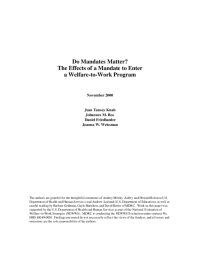Do Mandates Matter?
The Effects of a Mandate to Enter a Welfare-to-Work Program
Using data from an evaluation of two welfare-to-work programs in Riverside, Calif. and Grand Rapids, Mich., we find that requirements to participate in mandatory welfare-to-work programs can increase employment and earnings and reduce welfare income, independent of actual participation in the welfare-to-work program. Usually, these independent effects of the participation requirements are not captured by estimates of welfare-to-work program impacts, because program impacts are measured conditional on the actual showing up of those required to participate. In our analyses, we find larger effects of the mandate for welfare recipients who are more “job-ready” and for programs operating in healthier labor markets. We also find evidence that response to a mandate increases with the strength of enforcement and the level of penalties for noncompliance. Following welfare reform legislation of 1996, compliance requirements for welfare-to-work programs have become stricter and penalties for non-compliance have increased. Consequently, we expect the effects of these mandates to strengthen.







